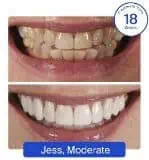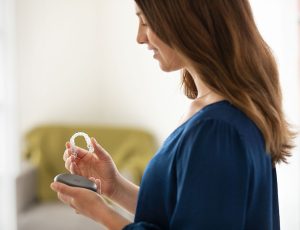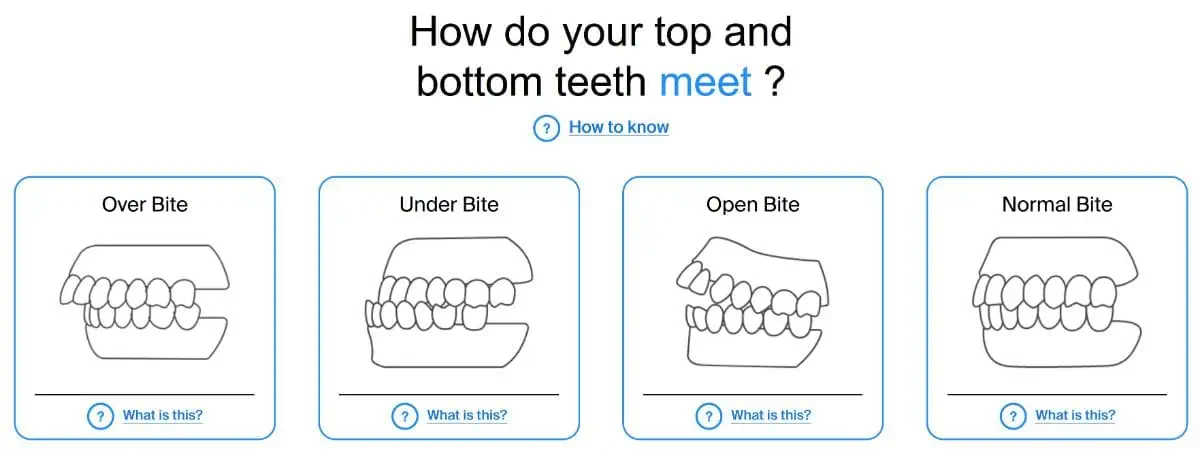If you are getting your teeth straightened with Invisalign, sensitive teeth may be an issue for you. Don’t worry you’re not alone.
Many people that get dental braces or clear aligners experience tooth sensitivity, pain or discomfort during their treatment. But, why, what are the causes, and does it mean something is going wrong with your treatment?
This article will answer the following questions about Invisalign teeth sensitivity so you know what’s normal and how to manage it:
- Does Invisalign cause teeth sensitivity?
- Why do Invisalign aligners cause sensitivity and discomfort?
- When should you be concerned?
- How can you avoid sore teeth from Invisalign?
- What can you do to manage pain from Invisalign?
If you are worried that your Invisalign treatment is making your teeth feel sensitive, keep reading to find out what to do. But first, let’s start with what sensitive teeth are and what causes them.
If you haven’t yet started your Invisalign treatment, you may want to consider the more affordable alternative Smile White. They can treat 90% of cases, have 3 in-person dentist appointments to ensure a good result, and as a bonus, you’ll get free whitening and retainers worth £790.
Book a FREE e-consultation or read our Smile White review for more information.
Use “DENTALY5OFF” to save an additional 5% on your treatment.
Why do teeth feel sensitive?

If you have ever felt a sharp pain or a dull ache in your teeth after consuming hot or cold food, breathing in cold air, brushing your teeth or even using extra minty toothpaste or mouthwash, then you might have sensitive teeth.
Sensitive teeth can be triggered by a variety of things as well as those mentioned above. So, why can hot, cold, sugary or spicy foods and drinks cause our teeth to feel pain or discomfort?
The reason can depend on a few different things, but a common cause is thinning or damaged tooth enamel. The top layer of your teeth consists of a protective layer or enamel that, when worn, may be penetrable by these triggers. There is a more sensitive layer of dentin underneath your enamel that can be easily aggravated by certain triggers.
Other causes of teeth sensitivity include:
- Exposed tooth roots
- Receding gums
- Gingivitis
- Tooth decay and cavities
- Pregnancy
- Dental work such as fillings
- Bruxism
- Brushing teeth too hard
- Orthodontic treatment
So, with all these causes in mind, you may be wondering why Invisalign aligners might cause teeth sensitivity.

- Treats up to 90% of Cases
- Up to 40% cheaper than Invisalign
- Buy now, pay later in interest-free instalments
- Rated 4.9/5 on Trustpilot
- As seen on 5, BBC, 4, DailyExpress, TheMail
- Get 5% OFF with our discount code DENTALY5OFF and FREE Whitening and Retainers worth £790
Does Invisalign cause teeth sensitivity?
The Invisalign system is a popular orthodontic treatment that can help you achieve the straight teeth you’ve always wanted. A common question asked is whether Invisalign causes sore teeth. The short answer is yes, but there are ways to treat it.

To understand why Invisalign causes teeth sensitivity and discomfort, we first need to look at how the treatment works. Both traditional braces and clear aligners work by applying pressure to the teeth in order to gradually straighten and align them over time. This pressure on the teeth can cause gum irritation, tooth sensitivity, and even gum recession over time.
The Invisalign system uses a series of removable clear plastic trays that fit over your teeth and apply pressure to move your teeth into the desired position. It can also involve the use of attachments and bands to help align your jaw in the event of an overbite or other misalignment.
Every couple of weeks you change to a new set of aligners to continue the process of moving and aligning your teeth. This means that you have constant pressure on not only your teeth but your gums and jaw. So it’s not surprising that you may feel sensitivity, pain and discomfort during your treatment.
The following video discusses Invisalign teeth sensitivity and answers common questions:
When should you be concerned?
Although some Invisalign teeth sensitivity is normal, if you are in extreme pain then consult your Invisalign dentist right away. Keep in mind that it does take time to get used to wearing aligners, and they won’t be completely pain-free.
How long does Invisalign teeth sensitivity last?
When you first start your Invisalign treatment, there is a high likelihood that your teeth will feel sore and sensitive. Many people find that the pain and discomfort or teeth sensitivity only lasts for the first few weeks while their teeth and mouth adjust to treatment.
However, everyone is different and you might find you have sore teeth from Invisalign aligners throughout your treatment, or not at all. Some people claim to have mildly sensitive teeth once they have completed their treatment and have stopped wearing their aligners.
One study found that although many people had pain and sensitivity with their Invisalign aligners, 83% of the people in the study adjusted to their aligners after their first week of treatment. 53% of people found that they only had mild pain and 35% did not experience any pain or discomfort at all.
What can you do about tooth sensitivity from Invisalign?
If you are struggling with teeth sensitivity from wearing your Invisalign aligners, don’t worry, there are a few things that you can do to help. While you should expect to have some sensitivity, especially when you first start your treatment, you can manage it so it doesn’t get unbearable.
- Maintain a good oral hygiene routine
- Only drink water while wearing your aligners
- Keep an eye on your diet and avoid acidic foods and drinks
- Clean and rinse your teeth after eating
- Try to avoid grinding your teeth
- Leave your aligners in as long as possible so your mouth adjusts to them quickly
- Use over-the-counter pain relief when necessary
The most important thing that you can do to avoid teeth sensitivity while undergoing Invisalign treatment (and even if you’re not) is to maintain a good oral hygiene routine. This is because regardless of your treatment, tooth decay can cause teeth sensitivity. So look after those teeth!

You can use specific products in your oral hygiene routine to help with sensitive teeth as well. These include sensitive toothpaste, mouthwash and serums. There are also other products that you can use that will help your teeth to feel less sensitive, including toothbrushes with soft bristles such as silicone toothbrushes.
Being aware of how hard you brush your teeth is also important. Some electric toothbrushes have pressure alerts and timers to let you know how long you are brushing and how hard.
Diet is another factor that can cause enamel erosion and tooth sensitivity. Eating acidic or sugary food and drinks can cause your enamel to thin, especially if you don’t clean your teeth before putting your aligners back in. This is because it traps the acidic foods and drinks beneath and increases the risk of decay and erosion.
Conclusion

Invisalign causes teeth to feel sensitive sometimes, but it’s only natural when you are forcing your teeth to change position. Any orthodontic treatment is going to cause some sensitivity. Straightening and aligning your teeth takes quite a bit of pressure and some people may feel it more than others.
Fortunately, there are a few things that you can do to manage it. Making sure you look after your oral health is an important factor. Having a good oral hygiene routine can make all the difference as can using products that help reduce sensitivity.
You can also use over-the-counter pain relief to help with discomfort, but if it’s really painful, then you should consult your dentist or orthodontist.
FAQS
Is it normal to have sensitive teeth with Invisalign?
Yes, it is normal to have sensitive teeth with Invisalign aligners because they use pressure to gradually straighten and align your teeth which may irritate the nerves in your teeth. They can also cause your jaw and gums to ache as your teeth move positions.
Why do my teeth hurt after finishing Invisalign?
Your teeth may hurt after finishing Invisalign because you may be used to wearing your aligners and the constant pressure. It is important that you remember to wear your retainer at this stage. Your teeth are in their new positions but they can easily move back at this point.
How long are teeth sensitive with Invisalign?
Everyone is different, but most people only have sensitive teeth for the first few weeks of their Invisalign treatment while their teeth and mouth adapt to the constant pressure. Some people experience teeth sensitivity for their entire treatment, and some find it incredibly uncomfortable.
The Angle Orthodontist. Discomfort associated with Invisalign and traditional brackets: A randomized, prospective trial. Consulted 8th May 2022.
Springer Link. Motivation, Acceptance and Problems of Invisalign® Patients. Consulted 8th May 2022.
NCBI. Patient survey on Invisalign ® treatment comparing [corrected] the SmartTrack ® material to the previously used [corrected] aligner material. Consulted 8th May 2022.




